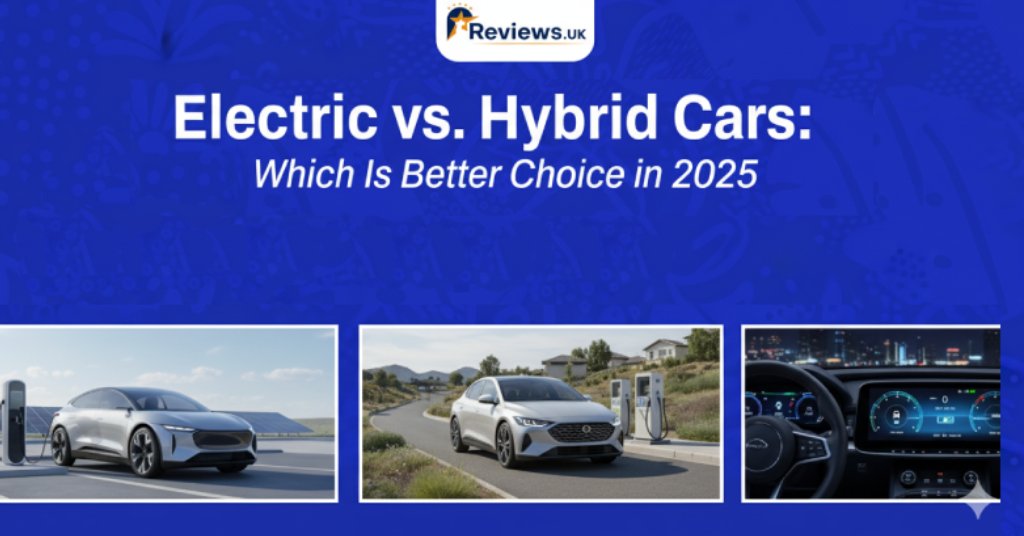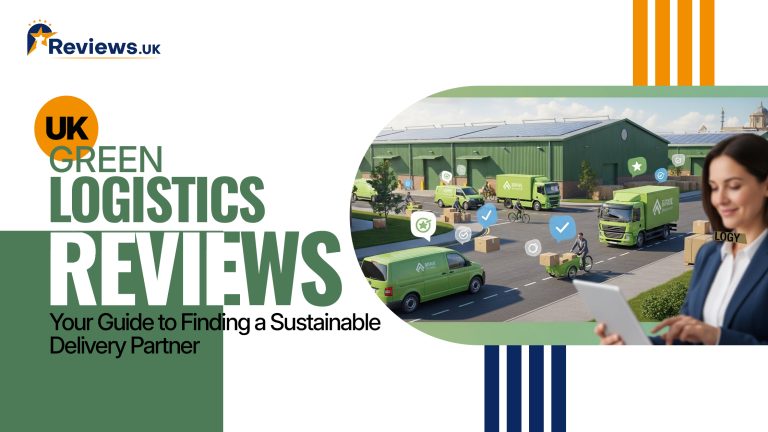Electric vs. Hybrid Cars: Which Is the Better Choice in 2025

UK drivers are at a crossroads in 2025, faced with one big question: which is better in the electric vs hybrid cars UK debate? With stricter environmental policies, upcoming petrol and diesel bans, and attractive government incentives for greener cars, choosing the right vehicle has never been more important. EVs promise zero emissions and long-term savings, while hybrids offer a safer middle ground for those hesitant about charging infrastructure.
In this fast-changing market, trustworthy platform reviews and expert comparisons are more important than ever—helping buyers avoid costly mistakes and select a car that truly suits their lifestyle. So, which is the smarter choice for 2025: a fully electric car or the best hybrid car 2025 UK drivers can rely on? Let’s explore.
Key Differences Between Electric and Hybrid Vehicles
In choosing between electric vs hybrid cars UK in 2025, it is important to be knowledgeable of how such vehicles operate as well as what they will provide.
EVs: Zero-Emission, Range Anxiety
Zero Emission
Electric cars are solely powered by batteries, meaning no tailpipe emissions—a significant win for the environment.
Driving-Experience-Cost
They also have no sound, and they are convenient and require less cost per mile than those that use petrol or diesel.
Range Anxiety
Nevertheless, some drivers are worried about the range anxiety. More extensive travel relies on charging systems, which are in progressively better shape, though not perfect, across all of the UK.
Hybrids: Petrol-Electric Blend, Greater Range, Reduced Charge Stops
Petrol-Electric Blend
Hybrids incorporate both an electric motor and a petrol engine, allowing people flexibility with the two power sources– a common topic among drivers exploring hybrid car questions UK to understand their practicality and benefits.
Greater Range
The hybrid has offered longer driving ranges than its electric counterparts, thus a perfect match to those with long-distance commuting or who reside in localities with a low number of charging stations.
Stopped Reduced Charge
Hybrids are not dependent on charging infrastructure and hence need not make very frequent charging stops.
Eco-Friendliness
Although hybrids are more efficient in fuel consumption compared to traditional cars, they use petrol; thus, on the contrary to EVs are not good to the environment.
EV vs Hybrid: Quick Comparison Table
| Feature | Electric Vehicles (EVs) | Hybrid Vehicles |
|---|---|---|
| Power source | 100% electric battery | Petrol engine + electric motor |
| emission | Zero tailpipe emissions | Lower than petrol/diesel, but not zero |
| Range | 180–350 miles (depends on model) | 500+ miles (combined petrol & electric) |
| charging | Needs home or public charging stations | Minimal charging needed, refuels at pump |
| maintaince | Fewer moving parts, lower maintenance | Similar to petrol cars, slightly cheaper |
| Best for | City driving, eco-conscious users | Long-distance commuters, mixed driving |
Cost Comparison in the UK (Purchase, Insurance, Running Costs)
Upfront Price Ranges
- Electric Vehicles (EVs): Generally cost between £25,000–£40,000, depending on the model and battery capacity.
- Hybrids: Slightly cheaper, with prices ranging from £20,000–£30,000, making them attractive for budget-conscious buyers.
Government Grants & ULEZ Exemptions
- EVs are eligible for many electric car incentives UK, including government grants and exemption from the Ultra Low Emission Zone (ULEZ) charge, making them far less expensive to use in the long term.
- Partial exemptions may be given to hybrids, yet they are not supported by the EV-level incentives.
Fuel vs. Electricity Savings
- EVs: Running on electricity is significantly cheaper per mile than petrol, especially with home charging.
- Hybrids: Save fuel compared to petrol or diesel cars but still require regular refuelling, making running costs higher than EVs.
Maintenance and Battery Replacement
- EVs: They have fewer moving parts and thus the maintenance costs are low. Yet, it may be costly to change the battery, of course, after the expiration of the warranty.
- Hybrids: They have the same maintenance as petrol cars (oil, engine), but with smaller batteries; however, they need parts which also need to be replaced every now and then.
Driving Experience and Convenience
Range Anxiety vs. Refuelling Flexibility
- EVs: During long journeys, drivers have what is called range anxiety, wherein they rely on charging points. Nevertheless, they have enough range when it comes to commuting within a city.
- Hybrids: Provide flexibility in refuelling; they can get refuelled in petrol whenever necessary, thus appropriate for long trips.
Performance and acceleration
- EVs: Instantaneous torque provides smooth and fast acceleration, a very fun car to drive, particularly during city traffic.
- Hybrids: These vehicles rely on the petrol engine, and in general, it is not as responsive as the EVs, which make it respond instantly to power requests.
Charging Infrastructure vs. Fuel Station Access
- EVs: Rely on public and home charging points; while infrastructure is growing, it’s still inconsistent in some areas of the UK.
- Hybrids: Can refuel at any petrol station, offering convenience and eliminating long charging waits.
City vs. Countryside Driving
- EVs: To use on city roads, a vehicle that has more charging points available and makes shorter journeys, so range is not a problem.
- Hybrids: Suitable in the countryside or long-distance travelling, where there are few charging points but there is easy access to petrol stations.
Environmental Impact and Legal Incentives
UK Government Deadlines (2035 Petrol Ban)
The UK government intends to prohibit selling new petrol and diesel models by 2035 and force motorists to switch to cleaner products, such as EVs and hybrids. Many drivers are already exploring hybrid car questions UK to understand tax breaks, grants, and other benefits available to early adopters before stricter regulations take effect.
Emission Zones and Congestion Charges
EVs: Exempted completely from ULEZ (Ultra Low Emission Zone) and London congestion fee, and could save hundreds of pounds every year to a frequent city driver.
Hybrids. For some low-emission hybrid cars, there is partial exemption; however, not possess all the benefits that electric cars possess.
Comparison of Carbon Footprint
- EVs: Zero-emission tailpipe, have a potentially huge reduction of the total carbon footprint, particularly when powered by renewable energy.
- Hybrids: less polluting than a petrol or diesel car, but still produce CO 2 just as a car that uses fuel.
What Do Real UK Drivers Say? Reading Trusted Reviews
A combination of real customer experiences may be more important than technical specs when considering a choice of EVs compared to hybrids in 2025. Whereas manufacturers have emphasized amazing ranges and advanced technologies, it is the nitty-gritty of ownership, such as battery life at low temperatures, fuel consumption on the highway, and post-purchase service, that ultimately matters to drivers. This is why one should not solely rely on brand marketing and looks beyond to find more reliability, quality of services and satisfaction with the ownership in general. Platforms such as Trustpilot, car enthusiast forums, and independent review websites give genuine insights from UK drivers, helping buyers avoid common pitfalls and make informed decisions when choosing the best hybrid car 2025 UK, based on real-world experiences rather than sales brochures.
Where to Read Trusted Reviews for Car Dealers, Sellers, and Rentals
It is important to seek out a good car dealer, or a second-hand seller, or even service provider when purchasing a car or a second-hand one, or even a car that is being rented out in 2025 just as it is imperative to choose a good car model to purchase. Reliable reviews will make you aware of pricing transparency, customer services quality and after sales services and thus avoid frauds or low retailing services. Always look for platforms where real UK customers share genuine experiences, as these reviews reveal how dealers handle complaints, warranty claims, and vehicle maintenance. Checking the best review sites UK can give you valuable insights before making any decision.
If you’re researching dealerships, second-hand sellers, or rentals, check real UK user feedback on platforms like:
Popular websites dealing in automobiles in 2025
- Setsailboattransport.com
- Leisuredrive.co.uk
- Obdxbox.com
- Auto Trader
- Drift Car Rental
- Motorsourcegroup.com
- Brautomotive.co.uk
- Alexanders Prestige
- Perrys.co.uk
- Cargiant.co.uk
Best Hybrid Car 2025 UK Picks
Volkswagen Golf eHybrid
Widely praised as “the best hybrid money can buy,” the eHybrid delivers excellent electric-only range (up to 88 miles WLTP), roomy practicality, smooth handling, and strong infotainment—making it a versatile all-rounder.
BMW 330e
Considered the top hybrid family car, the 330e strikes a balance between sporty performance and impressive efficiency, making it a cost-effective choice for company-car taxation—particularly in Touring estate form.
Honda Civic (Hybrid)
Honda’s 11th-generation Civic hybrid receives praise for its slick self-charging setup, city and motorway versatility, and strong real-world.
Conclusion
In 2025, everything will change, and you will have to choose between EVs and hybrids based on your lifestyle, location, and driving preferences. EVs are also suited to urban motorists who have access to charging facilities. EVs are more cost-effective to run, with no emissions, and they also contribute to the futureproofing of the UK as it prepares to phase out the use of petrol by 2035. In the meantime, hybrids are the ideal transmission solution to long-distance commuters or challenges in rural regions as petrol-supported reliability is offered with fewer charging issues. Although EVs are less costly in the long term, hybrids work better with those drivers who need greater flexibility but do not want to be completely electrified. If you have specific hybrid car questions UK drivers often ask—such as real-life performance, reliability, and service quality—always check verified customer reviews on platforms like Trustpilot or car-related forums before making a decision.











